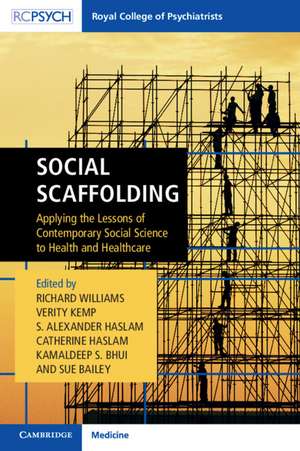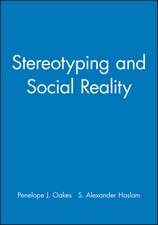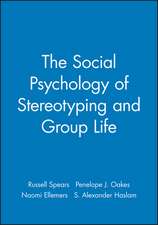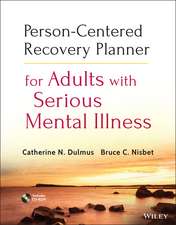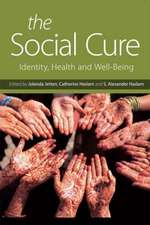Social Scaffolding: Applying the Lessons of Contemporary Social Science to Health and Healthcare
Editat de Richard Williams, Verity Kemp, S. Alexander Haslam, Catherine Haslam, Kamaldeep S. Bhui, Susan Bailey Daniel Maughanen Limba Engleză Paperback – 3 iul 2019
Preț: 346.87 lei
Preț vechi: 365.13 lei
-5% Nou
Puncte Express: 520
Preț estimativ în valută:
66.38€ • 69.05$ • 54.80£
66.38€ • 69.05$ • 54.80£
Carte disponibilă
Livrare economică 24 martie-07 aprilie
Livrare express 08-14 martie pentru 34.85 lei
Preluare comenzi: 021 569.72.76
Specificații
ISBN-13: 9781911623045
ISBN-10: 1911623044
Pagini: 362
Ilustrații: 7 b/w illus. 10 tables
Dimensiuni: 156 x 233 x 20 mm
Greutate: 0.54 kg
Editura: Cambridge University Press
Colecția RCPsych Publications
Locul publicării:Cambridge, United Kingdom
ISBN-10: 1911623044
Pagini: 362
Ilustrații: 7 b/w illus. 10 tables
Dimensiuni: 156 x 233 x 20 mm
Greutate: 0.54 kg
Editura: Cambridge University Press
Colecția RCPsych Publications
Locul publicării:Cambridge, United Kingdom
Cuprins
Part I. Introduction: 1. Health and society: contributions to improving healthcare from the social sciences Richard Williams; Part II. Schooling: 2. Six features of the human condition: the social causation and social construction of mental health Steven R. Smith; 3. Social sciences and health: a framework for building and strengthening social connectedness Catherine Haslam and S. Alexander Haslam; 4. The social identity approach to health S. Alexander Haslam, Jolanda Jetten and Catherine Haslam; 5. The relevance of social science to improving health and healthcare Daniel Maughan, Susan Bailey and Richard Williams; Part III. Scoping: 6. The social determinants of mental health Kamaldeep S. Bhui, Oliver Quantick and David Ross; 7. Laidback science: messages from horizontal epidemiology Alarcos Cieza and Jerome Bickenbach; 8. Parity of esteem for mental health Susan Bailey; 9. Belonging Peter Hindley; 10. Families and communities: their meanings and roles across ethnic cultures Hinemoa Elder; 11. The nature of resilience: coping with adversity Richard Williams and Verity Kemp; 12. The value of tolerance and the tolerability of competing values Jonathan Montgomery; 13. Towards partnerships in health and social care: a coloquium of approaches to connectedness Richard Williams, Susan Bailey and Verity Kemp; 14. Commentaries on core themes in Part III Jonathan Montgomery, S. Alexander Haslam, Adrian Neal and Richard Williams; Part IV. Sourcing: 15. Crowds and cooperation John Drury, Hani Alnabulsi and Holly Carter; 16. Emergencies, disasters and risk reduction: a microcosm of social relationships in communities Tim Healing, Anthony D. Redmond, Verity Kemp and Richard Williams; 17. Shared social identity in emergencies, disasters and conflicts John Drury and Khalifah Alfadhli; 18. Complex trauma and complex responses to trauma in the asylum context Cornelius Katona and Francesca Brady; 19. The mental health of veterans: ticking time bomb or business as usual? Deirdre Macmanus, Anna F. Taylor and Neil Greenberg; 20. Violent radicalisation: relational roots and preventive implications Kamaldeep S. Bhui and Rachel Jenkins; 21. Ways out of intractable conflict John Alderdice; 22. Agency as a source of recovery and creativity John Drury, Tim Healing, Richard Williams, Catherine Haslam and Verity Kemp; Part V. Scaffolding: 23. Making connectedness count: from theory to practising a social identity model of health Stephen Reicher; 24. Public health values and evidence-based practice Jonathan Montgomery and Richard Williams; 25. Social scaffolding: supporting the development of positive social identities and agency in communities Catherine Haslam, S. Alexandser Haslam and Tegan Cruwys; 26. Synthesising social science into healthcare Daniel Maughan and Richard William; 27. Relationships, groups, teams and long-termism Peter Aitken, John Drury and Richard Williams; 28. Caring for the carers Adrian Neal, Verity Kemp and Richard Williams; 29. The importance of creating and harnessing a sense of 'us': social identity as the missing link between leadership and health S. Alexander Haslam, Niklas K. Steffens and Kim Peters; 30. Smithtown as society Verity Kemp, Daniel Maughan, Richard Williams, Richard Mills and Tim Healing; Part VI. Sustaining: 31. Suit the action to the word, the word to the action Richard Williams.
Descriere
An approach to designing health care that explores how social factors and social identity determine health and recovery.
